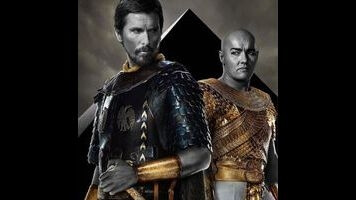Christian Bale leads a slog through the Old Testament in Ridley Scott’s Exodus

Every bit as fusty as Robin Hood, Ridley Scott’s biblical epic takes two off-beat, more or less mutually exclusive interpretations of Exodus—God is a delusion motivated by Moses’ latent guilt; God is real, but only helping the Jews because he wants to punish the Pharaohs for deifying themselves—and flattens them into 2.5 hours of digital mattes, CGI disasters, and scowling. If nothing else, Exodus: Gods And Kings makes it easier to appreciate Darren Aronofsky’s Noah, which, for all of its flaws, was at least animated by a personal relationship to the Old Testament.
Here, in a severely bronzed, English-accent version of Ancient Egypt, Moses (Christian Bale) is a decorated military leader and a favorite of the aging pharaoh Seti (John Turturro), who not-so-secretly wishes that Moses could inherit the throne in place of his vain son, Ramses (Joel Edgerton). Once Seti dies, his widow, Tuya (Sigourney Weaver, white as bleached bone and not even trying to do the accent), convinces her son to exile Moses and his family on the grounds of his rumored Israelite heritage, and sends a couple of assassins his way once he’s far enough from Thebes. (Yes, this is essentially a re-hash of Gladiator, complete with a similarly paced and scored opening battle scene and a climactic one-on-one showdown that swaps in the parted Red Sea for the floor of the Coliseum.)
Having escaped north into Midian, Moses reinvents himself as a farmer, marrying local beauty Zipporah (María Valverde), tending to his livestock, and generally trying to forget about all the people he killed and all the Israelites he helped enslave and oppress. Then he gets bonked on the head during a mudslide and sees a burning bush and, suddenly, he’s fidgeting to return to Egypt. So he sneaks back and, with the help of Nun (Ben Kingsley) and Joshua (Aaron Paul, trying his darnedest to turn half a dozen reaction shots into a character), begins freeing the Jews the only way he knows how—by turning them into an elite fighting force via training montage.
The idea that Moses led the Israelites out of Egypt because of a personality-altering head injury is compelling—though, admittedly, kind of funny—and fits with Bale’s performance, though it’s mostly unsupported by the rest of the film. As in Scott’s other Cecil B. DeMille-style historical epics (1492: The Conquest Of Paradise, Kingdom Of Heaven, the aforementioned Robin Hood), there’s a surplus of underdeveloped themes here: Moses as a madman, chiseling the Ten Commandments alone in a cave; God—played by 11-year old Isaac Andrews in Moses’ visions—as a jealous little boy who doesn’t want the Egyptians to have all the cool statues; Ramses as a wannabe tragic hero, who drives the slaves to rebellion by forcing them to build a temple to himself.
These all get trampled by Scott’s goofy, literalist rationalism, which tries to invent a scientific explanation for everything—the Red Sea parts because of a tidal wave, the Plague Of Boils is caused by disease spread during the Plague Of Flies—while preserving a sense of Sunday school spectacle, and ends up working as neither. (Scott and his screenwriters more or less give up when it comes to the Plague On The First Born.) At least DeMille knew how to put on a show; the best this offers are a few bursts of Old Testament camp, like the repeated scenes of Joshua spying on Moses from behind a rock or the sequence where Edgerton struggles to emote grief while a silicone baby prop flops around in his arms.